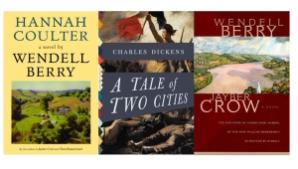About Us Menu
My Top Ten Books for 2013

For the past dozen springs, I've reflected on my favorite books from the previous year. This year’s list includes three works of fiction — a personal high. Here is my list for 2013:
 |
1. Hannah Coulter Beautifully paced, rich in human relationships, and flawlessly written, this novel touched me in a deeply personal way. Like Hannah Coulter — an octogenarian who looks back over the decades of her life — my mom grew up on a farm, raised three children, and lived through huge social change. At several points, I had to put the book down to give thanks for a parent who sacrificed so much. |
|
 |
2. Rise and Fall of the Third Reich by William Shirer (Simon & Schuster, 1960) If an author has ever captured the nature of evil in print, Shirer does so with Adolf Hitler. Bitter and brilliant, Hitler exemplifies how a small group of zealots can change the world. I remain most troubled by: the Church’s bending of the knee to National Socialism; appeasement by the western allies; and the many moral compromises made by the German military. These accommodations facilitated the deaths of millions, including the “final solution.” |
|
 |
3. Woodrow Wilson by A. Scott Berg (Putnam, 2013) I love this biography. President Wilson was a devout Christian, the son and grandson of Presbyterian ministers. His foreign policy aspirations strongly reflected his faith. Faced with grave political adversity, he wrote: "If I were not a Christian, I think that I should go mad, but my faith in God holds me to the belief that He is in some way working out His own plans through human perversities and mistakes." Sadly, his passivity toward Jim Crow laws cast a deep blemish on his tenure. |
|
 |
4. A Tale of Two Cities by Charles Dickens (Dover, 1859) On a basic level, Dickens weaves a fabulous plot during the time of the French Revolution — a family at risk, guillotine-hungry Parisians, and a high-risk escape. But the novel really shines at a deeper level — Christ-like self-sacrifice, courage in the face of overwhelming opposition, and redemption trumping vengeance. |
|
 |
5. American Grace: How Religion Divides and Unites Us by Robert Putnam and David Campbell (Simon & Schuster, 2010) A fascinating look at American religious practices, this book is chock-full of data and sophisticated analysis. Dr. Putnam, a renowned sociologist famed for his earlier work "Bowling Alone," notes that giving thanks at meals is the simplest way to distinguish between secular and religious Americans. It was my great pleasure to serve with Dr. Campbell on a "religious pluralism" panel hosted by the Aspen Institute. |
|
 |
6. Tyndale Old Testament Commentaries on 1 and 2 Chronicles by Martin Selman (InterVarsity Press, 2008) These twin commentaries focus on the stories of David, Solomon, and a divided kingdom. They tell of God's covenant faithfulness, sovereignty and justice. Regarding human nature, their conclusions are much more mixed. On the one hand, great leaders display incredible courage. On the other hand, foibles of self-lordship and syncretism are in full display. |
|
 |
7. Jayber Crow I've never cited the same author twice on a "best book" list before. But Wendell Berry, perhaps America's greatest living novelist, deserves to be an exception. In this — his best known work — an orphan boy becomes a barber in a small Kentucky village. Judged by human standards, Jayber Crow doesn't amount to much. But, by taking us into his soul, Berry unfolds the trueness of his character. |
|
 |
8. Steve Jobs by Walter Isaacson (Simon & Schuster, 2011) Jobs was an incredibly complicated person: brilliant, yet scattered; creative, yet destructive; an inspiring leader, yet a horrific follower. His life — cut needlessly short by his refusal to have early cancer surgery — divides readers into two camps: those who revere him and those who pity him. Sadly, his isolation, narcissism, and oft-personal cruelty place me in the latter category. |
|
 |
9. Great By Choice by Jim Collins and Morten Hansen (HarperCollins, 2011) I think that I've endorsed every book that Collins has ever written. His insight into organizational life is simply that good. In this work, he focuses on concepts such as "fanatic discipline," "empirical creativity," and "productive paranoia." He concludes on a note of humility: "In the end, we can control only a tiny sliver of what happens to us. But even so, we are free to choose..." |
|
 |
10. Defining Decade: Why Your Twenties Matter by Meg Jay (Hachette, 2012) Dr. Jay, a professor of Psychology at the University of Virginia, tackles the popular adage that "the 30s are the new 20s." Citing extensive research, she encourages twenty-somethings not to squander the decade in which "85% of all major life decisions are made." Disclaimer: I don't concur with all of Dr. Jay's premises or conclusions. But this is an important book. |
|